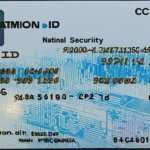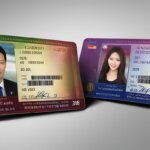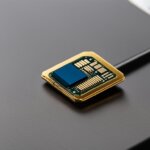Table of Contents
A national identity card is an official government-issued document that confirms a person’s identity and citizenship. It contains personal data, such as name, address, date of birth, and a photograph. National identity cards are typically used for various administrative or legal purposes, such as applying for a passport, opening a bank account, or registering to vote.
What is a national identity card? It is a means of identification that serves as proof of a person’s identity and citizenship. It is an essential document that provides legal recognition of an individual and their nationality. In this section, we will explore the different functions and types of information found on a national identity card. We will also discuss how it differs from other forms of identification documents.
Key Takeaways
- National identity cards are government-issued documents that confirm a person’s identity and citizenship.
- They are essential for administrative and legal purposes, ranging from opening a bank account to applying for a passport.
- National identity cards contain personal data, such as name, address, date of birth, and a photograph.
- They differ from other forms of identification documents in their standardized format and functions.
- The implementation of national identity cards carries potential benefits and challenges that need to be carefully considered.
What is a National Identity Card?
A national identity card is an official document used to confirm a person’s identity and citizenship. Unlike other identification documents, such as driver’s licenses or passports, national identity cards are issued by the government. They typically feature a photograph, personal details, and a unique identification number.
The purpose of a national identity card is to provide a standardized form of identification that can be easily recognized and verified by authorities. In some countries, the use of national identity cards is mandatory for accessing government services or voting in elections.
National identity cards can differ from other identification documents in several ways. One of the most significant differences is that they are not typically used for travel purposes. National identity cards are designed to confirm identity within a single country, while passports are used for international travel.
The information contained on a national identity card can vary depending on the country. In some cases, it may include biometric data, such as fingerprints or iris scans, to further enhance security measures. Other types of information that may be included are date of birth, place of birth, and address.
Some countries have opted for a chip and pin system on their national identity cards as an additional security measure. The card can hold information about the card owner, including personal details, and can be used for online authentication and signatures.
Functions of National Identity Cards
National identity cards have several functions and uses in society. They serve as a crucial tool for verifying personal identity, confirming citizenship, and facilitating various administrative processes. National identity cards help in:
- Identity Verification: One of the primary functions of national identity cards is to confirm the identity of individuals. These cards are used as official documentation to verify identity when opening bank accounts, obtaining credit, or registering for services.
- Citizenship Confirmation: National identity cards also serve as proof of citizenship. They provide an efficient way to confirm an individual’s nationality, especially when traveling across borders.
- Administrative Processes: National identity cards help in streamlining administrative processes. They are used as a standard form of identification, aiding government agencies while processing various applications for services such as healthcare, pensions, and social welfare benefits.
In addition to these functions, national identity cards play a significant role in ensuring security and preventing fraud. They allow for a more accurate identification of individuals during identity confirmation and make it harder for criminals to exploit official documents.
Overall, national identity cards benefit society by simplifying administrative procedures, providing an official form of identification, and bolstering security measures.
Importance of National Identity Cards
National identity cards play a vital role in verifying personal identity and citizenship, but their importance extends beyond these core functions. One of the main benefits of having a standardized identification system is to increase the efficiency of government processes.
Standardized identity cards ensure that every citizen has an official identity recognized by the government, making access to public services more streamlined and efficient. This is particularly true for services that require personal identification, such as voting, taxation, and healthcare.
Additionally, national identity cards have the potential to enhance national security measures. They can provide a way to track and monitor individuals, and even businesses, aiding in the prevention of criminal and terrorist activities. Furthermore, identity cards can reduce the risk of fraud and error in administrative processes and reduce the administrative burden on the government.
Despite the advantages, some people express concerns regarding the implementation of national identity cards. Critics argue that such cards can violate personal privacy, lead to marginalization of minority groups and increase the risk of identity theft. Careful consideration is therefore needed when deciding whether to implement a national identity card scheme.
The Pros and Cons of National Identity Cards
| Pros | Cons |
|---|---|
| They can facilitate access to public services and streamline administrative processes. | They can be expensive to implement, costing billions of pounds. |
| They could combat identity fraud and errors in administrative processes. | It could lead to the marginalization of certain minority groups. |
| They can aid in national security measures, helping to prevent terrorism and other crimes. | They can potentially violate personal privacy rights. |
Overall, national identity cards can provide significant benefits, but their implementation must be done carefully and with full consideration of the potential risks. Done well, such cards can have a tremendously positive impact on society, enhancing safety, efficiency, and fairness.
Conclusion
In summary, national identity cards play a vital role in confirming personal identity and citizenship, facilitating administrative processes, and enhancing security in a society. The benefits of having a standardized identification system include easier access to services, increased efficiency in government processes, and enhanced national security.
However, it is crucial to carefully consider the potential challenges and criticisms associated with national identity cards. Privacy concerns, data protection, and potential discrimination based on socio-economic status or race are some of the issues that need to be addressed to ensure a fair and transparent implementation of national identity cards.
To conclude, while national identity cards have their advantages, their implementation needs to be well-thought-out, taking into account the potential issues and concerns. It is important to strike a balance between enhancing security and protecting individual rights and privacy.
FAQ
What is a national identity card?
A national identity card is an official government-issued document that is used to confirm a person’s identity and citizenship. It typically contains personal details such as the individual’s full name, date of birth, photograph, and unique identification number.
How does a national identity card differ from other forms of identification?
Unlike other forms of identification such as passports or driver’s licenses, a national identity card is specifically designed to confirm an individual’s identity and citizenship within the country of issuance. While passports are primarily used for international travel, and driver’s licenses for driving privileges, national identity cards serve as a comprehensive proof of identity within a specific jurisdiction.
What information is typically found on a national identity card?
A national identity card generally includes the individual’s full name, date of birth, gender, photograph, signature, and unique identification number. Additional information such as the individual’s address or biometric data may also be included, depending on the specific requirements and security features implemented by the issuing authority.
What are the functions of national identity cards?
National identity cards serve multiple functions in a society. They are primarily used to verify an individual’s identity and confirm their citizenship, allowing them to access various services and benefits provided by the government. Additionally, national identity cards facilitate administrative processes such as voter registration, taxation, and social welfare programs. They also play a crucial role in ensuring national security by providing a standardized and reliable form of identification.
Why are national identity cards important?
National identity cards contribute to the efficiency of government processes, as they provide a standardized and easily verifiable form of identification. They enable individuals to access services and benefits more easily, reducing the administrative burden for both citizens and government agencies. National identity cards also enhance national security by deterring fraudulent activities and ensuring that individuals who are entitled to certain rights and privileges receive them. However, it is important to carefully consider the challenges and criticisms associated with national identity cards, such as privacy concerns and potential exclusions of marginalized populations.













